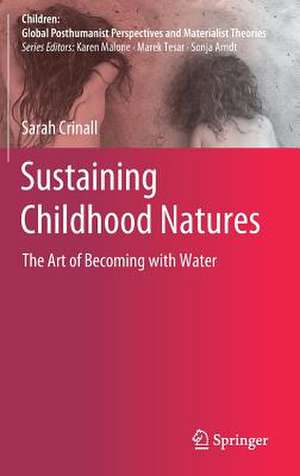Sustaining Childhood Natures: The Art of Becoming with Water: Children: Global Posthumanist Perspectives and Materialist Theories
Autor Sarah Crinallen Limba Engleză Hardback – 24 ian 2019
This book examines sustainability learning with children, art and water in the new material, posthuman turn. A query into how we might sustain (our) childhood natures, the spaces between bodies and places are examined ontologically in daily conversations. Regarding philosophy, art, water and her children, the author asks, how can I sustain waterways if I am not sustaining myself?
Theoretically disruptive and playful, the book introduces a new philosophy that combines existing philosophies of the new material and posthuman kind. The ecological sciences, and the arts, are drawn together / apart to help recognize sustainability in its emergent, relational form. All the while this book, as art, engages and flows over the reader – as such, reading it becomes a transformative, meditative experience. Daily rhythms of ‘being-with’ art, water and children take the reader beyond orientations of environmental education that focus on notions of lack and reduction. New possibilitiesfor sustaining childhood natures – for what is becoming, and unbecoming – emerge here in the making processes of an academic, everyday life in early motherhood.
Preț: 731.41 lei
Preț vechi: 891.96 lei
-18% Nou
Puncte Express: 1097
Preț estimativ în valută:
139.96€ • 144.39$ • 116.79£
139.96€ • 144.39$ • 116.79£
Carte tipărită la comandă
Livrare economică 26 martie-09 aprilie
Preluare comenzi: 021 569.72.76
Specificații
ISBN-13: 9789811330063
ISBN-10: 9811330069
Pagini: 273
Ilustrații: XXI, 245 p. 180 illus., 161 illus. in color.
Dimensiuni: 155 x 235 mm
Greutate: 0.55 kg
Ediția:1st ed. 2019
Editura: Springer Nature Singapore
Colecția Springer
Seria Children: Global Posthumanist Perspectives and Materialist Theories
Locul publicării:Singapore, Singapore
ISBN-10: 9811330069
Pagini: 273
Ilustrații: XXI, 245 p. 180 illus., 161 illus. in color.
Dimensiuni: 155 x 235 mm
Greutate: 0.55 kg
Ediția:1st ed. 2019
Editura: Springer Nature Singapore
Colecția Springer
Seria Children: Global Posthumanist Perspectives and Materialist Theories
Locul publicării:Singapore, Singapore
Cuprins
1 Introduction, water body, I am.- 2 Unraveling water; whirling washing maching (a re-view of water).- 3 Edie's knitted shearwater (onto-methodologies of early mother/childhood).- 4 'Women sometimes go to these places' (a maternal sustainability with water).- 5 Nests (as spaces, places, bodies and time).- 6 Lawson street Swale painting (the sustaining nature of home).
Notă biografică
Sarah Crinall writes with the material of everyday life in a 1970’s Coldon beach home on shearwater swampland, between Western Port bay and Bass Strait’s Southern Ocean. Sarah has been mothering, writing, researching and creating on the Australian southern coast for eight years now. Living with her husband, Paul, and daughters, Edith and Vivi, new practices and daily rhythms have emerged with Sarah’s research, which swims in the queries that sustainability provokes.
Sarah writes in the spaces of early motherhood from the couch, at the dining table, and in bed with everyday momentary and bodily encounters. As she writes, the words change shape with the landscape surrounds and homely wares.
As a marine ecologist and educator, Sarah began using art to make room for people and water to be together in a more embodied way. A young girl once asked: We know you love waterways, but why should we? From there Sarah found herself pursuing a doctorate on the relationship between artists and waterways.
Sarah completed her doctorate, Blogging Art and Sustenance: Artful everyday life (making) with water, in 2017. This dissertation received an AERA award (Division D Outstanding Dissertation Award). This thesis is the basis for this monograph – Sustaining childhood natures: The art of becoming with water.
In the past five years, Sarah has enjoyed making and sustaining everyday with other various lives on Phillip Island. With co-mothers, Sarah formed a playgroup (the Phillip Island Family playgroup); and helped with the inception of a new primary school, Phillip Island Village School, Ventnor as a co-founding board member. Now Edith, Vivi and Sarah are energised and nourished in weekly ‘Barn School’ forays. Here local families, children and parents can gather, explore and be together in shared experiences around Phillip Island in sync with the season. Sarah continues to write passionately on the matter(s) of motherhood and bodyplace lives.
Textul de pe ultima copertă
This book examines sustainability learning with children, art and water in the new material, posthuman turn. A query into how we might sustain (our) childhood natures, the spaces between bodies and places are examined ontologically in daily conversations. Regarding philosophy, art, water and her children, the author asks, how can I sustain waterways if I am not sustaining myself?
Theoretically disruptive and playful, the book introduces a new philosophy that combines existing philosophies of the new material and posthuman kind. The ecological sciences, and the arts, are drawn together / apart to help recognize sustainability in its emergent, relational form. All the while this book, as art, engages and flows over the reader – as such, reading it becomes a transformative, meditative experience. Daily rhythms of ‘being-with’ art, water and children take the reader beyond orientations of environmental education that focus on notions of lack and reduction. New possibilities for sustaining childhood natures – for what is becoming, and unbecoming – emerge here in the making processes of an academic, everyday life in early motherhood.
Caracteristici
Contributes to sustainability learning conversations by offering everyday life as a site for learning where children are part of the research outside of a school setting Important for women’s studies Vital for creative research methodologies audiences - written as art shifting the reader’s engagement with their own everyday life through sensations and resonance to engage its sustaining nature Examines water in relation to sustainability and waterway-health in a new way, by understanding ourselves as water that is always, already moving through bodies and landscapes Illustrates ideas beyond rational cognitive arguments as art, poetry, prose, blogging and materials encountered through early motherhood along with academic philosophy on art, ecology, environmental education, sustainability, body and place











